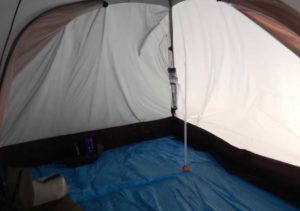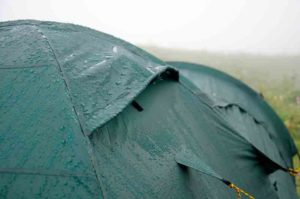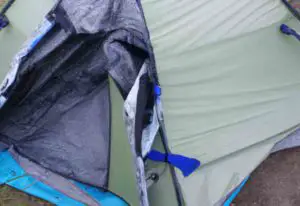When you’re out on a camping trip, there are two types of shelters that you can choose from Backpacking Tent or Hammock. In this blog post, we will discuss the pros and cons of each option and help you decide which one is right for you!
What Is a Backpacking Tent and What Are Its Advantages Over a Hammock
When it comes to camping, there are two main schools of thought: those who prefer to rough it in a tent, and those who prefer to relax in a hammock. But what if there was a third option that combined the best of both worlds? Enter the backpacking tent.
Backpacking tents are lightweight and easy to carry, making them ideal for hikes and other adventures in the great outdoors. But unlike traditional tents, backpacking tents don’t require you to find a level spot on the ground to set up camp. Instead, they can be attached to trees or other sturdy objects, providing a comfortable and secure sleeping space off the ground.
So whether you’re looking to hike the Appalachian Trail or simply enjoy a weekend in the woods, a backpacking tent is a great option for your next camping trip.
What Is a Hammock and What Are Its Advantages Over a Backpacking Tent
A hammock, simply put, is a hanging bed. The hammock dates back to pre-Columbian South America and was originally made out of cotton or other plant fibers. Nowadays, hammocks are usually made from synthetic materials such as nylon or polyester. They come in a variety of sizes and colors, and can even be personalized with your design. But what are the advantages of a hammock over a backpacking tent?
For starters, hammocks are much lighter and more compact than tents, making them ideal for backpackers who want to travel light. They’re also quick and easy to set up – no more fumbling around with poles and guy lines! And when it comes to comfort, there’s simply no comparison. Hammocks allow you to relax in complete comfort, while tents can feel cramped and claustrophobic.
Plus, there’s nothing quite like falling asleep under the stars in a hammock! So if you’re looking for a more comfortable and convenient camping experience, ditch the tent and give hammocking a try.
The Pros and Cons of Backpacking Tents
Pros:
- Lightweight and easy to carry
- No need to find a level spot on the ground
- Can be attached to trees or other sturdy objects
Cons:
- More expensive than traditional tents
- Not as comfortable as hammocks
The Pros and Cons of Hammocks
Pros:
- Lighter and more compact than tents
- Quick and easy to set up
- More comfortable than tents
- Can be used in a variety of settings (e.g. camping, hiking, backpacking)
Cons:
- Not as durable as tents
- Can be difficult to find level ground to set up on
Is It Better to Sleep in A Tent or A Hammock While Backpacking?
There is no one-size-fits-all answer to this question, as the best sleeping arrangement for backpacking will depend on a variety of factors. However, in general, tents tend to provide more protection from the elements and privacy, while hammocks can be more comfortable and lighter weight. Some backpackers even use a combination of both, spending nights in a hammock when conditions are good and setting up a tent when they need extra protection.
Here are some things to consider when choosing between sleeping in a tent or hammock while backpacking:
Climate: In general, tents provide better protection from cold weather than hammocks. If you’ll be camping in an area with freezing temperatures or strong winds, you’ll be better off in a tent.
Bug protection: Tents can also provide better protection from insects than hammocks. If you’re camping in an area with mosquitoes or other biting bugs, a tent will help keep them out.
Comfort: Hammocks are often more comfortable than tents, as they allow you to sleep in a relaxed position. However, if you have back or neck pain, a tent may be a better option.
Weight: Hammocks are typically lighter and more compact than tents, making them ideal for backpackers who want to travel light.
Ease of setup: Hammocks are usually quicker and easier to set up than tents. If you’re looking for a hassle-free camping experience, a hammock is a way to go.
Privacy: Tents provide more privacy than hammocks, as they can be set up in a secluded spot away from prying eyes.
So, which is better for backpacking – a tent or a hammock? It all depends on your individual needs and preferences. If you’re looking for the lightest and most compact option, go with a hammock. If you need more protection from the elements or insects, choose a tent. And if you want the most comfortable camping experience possible, consider using both!
Is It Preferable to Have a Tent or Hammock for Camping?
There is no single answer to this question as it depends on a variety of factors, including personal preferences and the specific conditions of the camping trip. Some people prefer tents because they provide more protection from the elements and can be easily partitioned off for privacy.
Others find hammocks more comfortable and convenient, especially if space is limited. Ultimately, it’s up to each camper to decide which type of shelter would work best for them.
Do Hammocks Improve the Backpacking Experience?
Hammocks do improve the backpacking experience because they are lightweight and easy to set up, which means you can save space and weight in your backpack. They are also great for hot weather because they keep you off the ground and allow air to circulate underneath you, helping to keep you cool.
Hammocks are not as comfortable as a traditional camping mattress, so if you’re looking for a good night’s sleep I would recommend using a hammock in combination with a camping mattress. But for short hikes or overnight trips, a hammock is a great alternative to a sleeping bag and tent.
What Are Some of The Disadvantages of Using a Hammock?
There are a few potential disadvantages to using a hammock instead of a more traditional bed. One is that it may not be as supportive for your back and spine, especially if you have any medical conditions that require a certain level of support while sleeping.
Additionally, hammocks can be difficult to get in and out of without assistance, which may not be ideal if you need to get up in the middle of the night. Finally, because they’re not as common as traditional beds, it can be harder to find sheets and blankets that fit properly on a hammock.
Is It Safe to Sleep in A Hammock While Camping?
One of the main concerns when sleeping in a hammock is that you could fall out and hurt yourself. However, if you use a proper camping hammock with straps and tie it securely to trees or other sturdy objects, the risk of falling out is greatly minimized.
Another concern is that sleeping in a hammock can be uncomfortable and cause joint or muscle pain. Again, this depends on the type of hammock you use – some are designed for comfort and support while others are not. If you have any concerns, it’s best to consult with a doctor before using a hammock for camping.
How Do Hammocks Keep Dry in The Rain?
Most hammocks have a hole at each end, through which the occupant hangs a rain fly to keep the hammock and its occupant dry. The fly is pitched like a tent, using trekking poles or sticks, to create an A-frame.
What Are the Pros and Cons of Sleeping in A Hammock?
Hammocks are a great way to sleep, assuming you’re not camping in an area with lots of bugs. They offer a comfortable, flat surface for sleeping and can be set up in minutes. They’re perfect for camping trips, backyard relaxation, or even used as a temporary bed when guests come over.
The main downside of using a hammock is that they can be less stable than beds and can swing around more when people get in and out. This can make it difficult to stay asleep if you’re not used to sleeping in a hammock. Additionally, they can be tricky to set up correctly, so it’s always important to follow the instructions carefully.
Conclusion
So there you have it! The pros and cons of backpacking tents and hammocks. Consider your needs and preferences, and choose the shelter that will best help you enjoy your next camping trip. happy trails!
If you’re looking for a more comfortable and convenient camping experience, ditch the tent and give hammocking a try. Hammocks are lighter, more compact, and quick and easy to set up. Plus, they’re more comfortable than tents! So if you’re looking for a better camping experience, go with a hammock.








